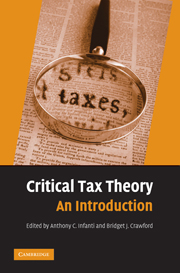Book contents
- Frontmatter
- Contents
- List of Illustrations
- List of Tables
- List of Contributors
- List of Common Abbreviations
- Introduction
- CHAPTER 1 FOUNDATIONS OF CRITICAL TAX THEORY
- CHAPTER 2 HISTORICAL PERSPECTIVES ON TAXATION
- CHAPTER 3 THE GOALS OF TAX POLICY
- CHAPTER 4 CRITICAL TAX THEORY MEETS PRACTICE
- CHAPTER 5 RACE AND TAXATION
- CHAPTER 6 GENDER AND TAXATION
- CHAPTER 7 SEXUAL ORIENTATION AND TAXATION
- CHAPTER 8 THE FAMILY AND TAXATION
- CHAPTER 9 CLASS AND TAXATION
- CHAPTER 10 DISABILITY AND TAXATION
- CHAPTER 11 GLOBAL CRITICAL PERSPECTIVES ON TAXATION
- CHAPTER 12 CRITICAL PERSPECTIVES ON CRITICAL TAX THEORY
- Index
CHAPTER 12 - CRITICAL PERSPECTIVES ON CRITICAL TAX THEORY
Published online by Cambridge University Press: 04 August 2010
- Frontmatter
- Contents
- List of Illustrations
- List of Tables
- List of Contributors
- List of Common Abbreviations
- Introduction
- CHAPTER 1 FOUNDATIONS OF CRITICAL TAX THEORY
- CHAPTER 2 HISTORICAL PERSPECTIVES ON TAXATION
- CHAPTER 3 THE GOALS OF TAX POLICY
- CHAPTER 4 CRITICAL TAX THEORY MEETS PRACTICE
- CHAPTER 5 RACE AND TAXATION
- CHAPTER 6 GENDER AND TAXATION
- CHAPTER 7 SEXUAL ORIENTATION AND TAXATION
- CHAPTER 8 THE FAMILY AND TAXATION
- CHAPTER 9 CLASS AND TAXATION
- CHAPTER 10 DISABILITY AND TAXATION
- CHAPTER 11 GLOBAL CRITICAL PERSPECTIVES ON TAXATION
- CHAPTER 12 CRITICAL PERSPECTIVES ON CRITICAL TAX THEORY
- Index
Summary
The authors in this chapter call into question the baseline assumptions, methodologies, and solutions proposed by critical tax scholars. In Redistributive Justice and Cultural Feminism, William J. Turnier, Pamela Johnston Conover, and David Lowery question whether there is any empirical support for a relationship between feminist self-identification and support for particular tax policies. The authors implicitly critique scholars who apply Carol Gilligan's theory of women's different moral reasoning to suggest either that “feminism” – however defined – supports income tax progressivity and the redistribution of wealth, or that a feminist tax system would be different from the current one.
In Taking Critical Tax Theory Seriously, Lawrence Zelenak evaluates much critical tax scholarship as biased, lacking practical solutions, and agenda-driven. He exhorts feminist scholars in particular to pay attention to “careful balancing of conflicting feminist goals and careful development of legislative proposals that will actually further those goals.” Zelenak scrutinizes the work of a number of critical tax scholars in his article to prove his points; however, space only permits us to reproduce his critiques of a few articles by way of example.
Joseph Dodge extends and complicates Zelenak's critique in A Feminist Perspective on the QTIP Trust and the Unlimited Marital Deduction. Dodge is more inclined than Zelenak to see misogyny in the rule that permits an unlimited estate tax marital deduction for property left in a certain type of trust – a “qualified terminable interest property” trust – which gives a surviving spouse limited rights with respect to the trust property. But Dodge is critical of feminists for accepting the baseline principle of an estate tax marital deduction.
- Type
- Chapter
- Information
- Critical Tax TheoryAn Introduction, pp. 363Publisher: Cambridge University PressPrint publication year: 2009
- 1
- Cited by



